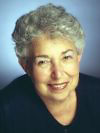Issue Archive
President’s Column: Always Present, Always Prepared
 The emergency call came from Jerusalem’s Mayor Uri Lupolianski. After two weeks of daily rocket attacks, 10 deaf families in northern Israel desperately wanted to leave their homes. I shuddered to imagine facing explosions without being able to hear the warning sirens. Could Hadassah help? I didn’t hesitate. Our Judaean Youth Hostel in Jerusalem was busy with young tourists who had changed their itineraries because of the summer war. But of course we would make rooms available.
The emergency call came from Jerusalem’s Mayor Uri Lupolianski. After two weeks of daily rocket attacks, 10 deaf families in northern Israel desperately wanted to leave their homes. I shuddered to imagine facing explosions without being able to hear the warning sirens. Could Hadassah help? I didn’t hesitate. Our Judaean Youth Hostel in Jerusalem was busy with young tourists who had changed their itineraries because of the summer war. But of course we would make rooms available.
Every one of you, I know, would have answered as I did. In moments of joy or sadness, I am sustained by Hadassah members and associates’ love of Zion. No president of any organization in the world is so blessed.
In the face of the urgent challenges Israel has faced during and after the war with Hezbollah began, Hadassah is uniquely equipped to help because we are on the ground with all of our institutions and projects.
The beginning of the war coincided with hadassah’s national convention in Nashville. The tone and content changed instantly. A planned discussion of Israel’s post-intifada challenges in a period of relative calm yielded to the new physical and emotional needs of the people of Israel. Suddenly, our youth villages were housing immigrant kids and families. Suddenly, we were sending doctors, nurses, social workers and psychologists to beleaguered Nahariya. Our social workers coaxed elderly immigrants paralyzed by fear out of their apartments and into the shelters and treated traumatized children. Students, teachers, doctors and nurses from the Hadassah family were called to Army reserve units. Among the dead was Yehudah Greenfeld, a biotechnology student at Hadassah College Jerusalem and a young father of two. May his memory and the memories of Israel’s other brave soldiers and civilians be for a blessing.
In the first weeks of the war, Hadassah members responded with both an emergency fund and a solidarity mission. Money would be needed above your usual commitments, and you gave generously. Two busloads of members and associates drove from Ben-Gurion Airport to Haifa, the only such mission to spend a night in that city during the war. My heart swelled and tears filled my eyes when Haifa’s mayor, Yona Yahav, said he knew Hadassah would never cancel, and when Miki Goldwasser, mother of kidnapped soldier Ehud Goldwasser, talked of the strength Hadassah gave her and the people of Israel.
Nearly 4,000 rockets fell on northern Israel, hitting cities, villages and forests. Like all of you, I grew up with a blue JNF box, where all our change went for planting trees in Israel. I’ve sent and received trees to mark important life passages. My family received many tree certificates in 1956 when I married an engineer working for the American army named Barry Walker. Contrary to myth, there are no names on the trees of Israel, so you never know exactly which one was planted for you. But over the years I loved to watch the Israeli forests grow—pine and carob, tamarisk and cedar. Those once skinny trees thickened and grew tall, covering bare hillsides. Barry and I were fortunate to celebrate our 50th anniversary recently. It was just around the time I visited Israel’s charred northern forests. So when the ranger said that the forest had been set back 50 years, I felt unbearably sad.
More than our trees are threatened. Not since Hitler has a world leader called for the destruction of six million Jews as has Iran’s President Mahmoud Ahmadinejad. But we cannot afford to waste time wringing our hands. We stand fully committed—to use our resources to heal and build, replant and grow. We have just begun a new Jewish year, with its promise of renewal, and we, too, must renew our commitment to the State of Israel.
Warm wishes for a sweeter 5767 for the Jewish people everywhere and to each of you and your families. In the words of Ezekiel, “And the tree of the field shall yield its fruit and the earth shall yield increase and they shall be safe in their land.”
G’mar hatima tova.










 Facebook
Facebook Instagram
Instagram Twitter
Twitter
Leave a Reply